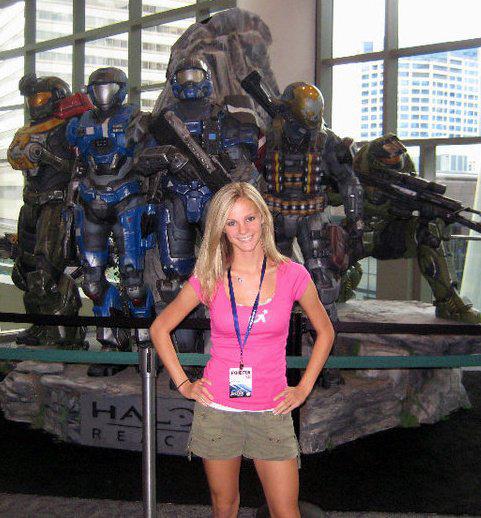An SRU alumna helped work on the videogame “Destiny,” which has over 13 million players, after gaining notoriety for becoming Major League Gaming’s first professional female gamer at just 12 years old.
Bonnie Burton, 25, began gaming at age 11. Her older brothers originally asked her to play Halo with them so that they could use her character as target practice. It wasn’t long after that that she found she was keeping up with, and even beating her brothers.
When they realized the talent they had as a team, the family started going to local tournaments, eventually advancing to regional tournaments, and even national ones. When she was 12, the team placed third in a national competition, and garnered the attention of the then very small, Major League Gaming.
“I think I made an impression being not only a woman, but also being as young as I was,” Burton said. “It just goes to show that you should never be barred by your circumstances.”
The team signed a contract with Major League Gaming, and they toured across the country with them for five years. Of her experience, Burton said that it was great opportunity to meet new people and travel, and that she made a lot of lifelong friends.
Burton stopped gaming after she enrolled at SRU, saying that she wanted to focus on her studies. She recieved awards for Outstanding Academic Achievement in the computer science department, as well as an Outstanding Senior award. She graduated Suma Cum Laude with a degree in Information Technology in 2013.
During her time at SRU, she became G4’s E3 Booth Babe at 21 years old, and worked in video game marketing for a bit after she graduated. Last April, she was hired to work as a difficulty tester at Bungie, the company that made “Halo,” on the game “Destiny,” which was released last September. From there, Burton began working as a tester for the multiplayer aspect of “Destiny,” a job she began in September.
“Getting my start in multiplayer games, I know firsthand how important it is to ensure players are happy with their gaming experiences with each other,” Burton said. “Destiny is my favorite game because you get to customize your gaming experience to whatever you want it to be. There’s a lot people can look forward to for the future.”
Despite her success in the gaming industry, with over 12 years of involvement under her belt, Burton said that she still gets looked down upon as a woman gamer.
“The biggest misconception about female gamers is that they don’t exist,” Burton said. “More and more women are breaking into, and contributing to the industry. Their voice is valuable, and they deserve to be heard.”
Of her own experiences with sexism, Burton said that she was often accused of not being a “real gamer,” and that she was competing in games for attention.
“People always accuse women gamers of being ‘fake,’” Burton said. “Why would someone fake a passion for something just for attention?”
Burton advised people who aspire to do what she does to go to live events and network. She said that the gaming industry is small enough to break into, as long as someone is willing to go for it.
Though Burton said she doesn’t know what the future holds, she said that she never thought she’d be where she was today, and she hopes to keep making strides in the industry.
“I want to take opportunities to help the industry mature and become more accepting,” Burton said. “I also want to continue to develop a gaming experience that really bonds players together.”








